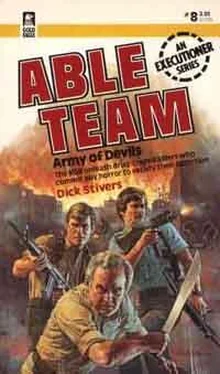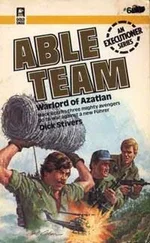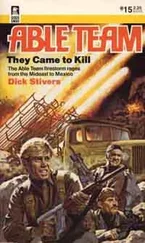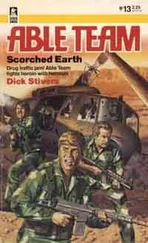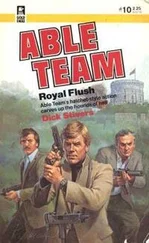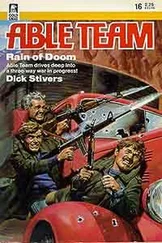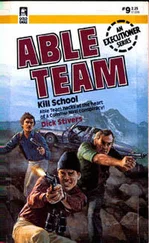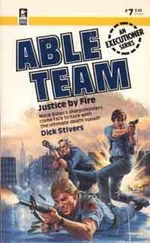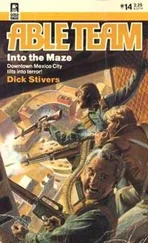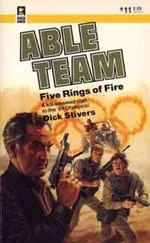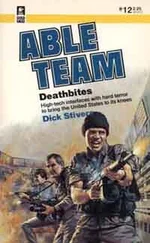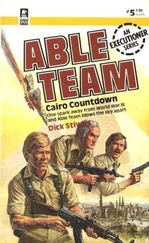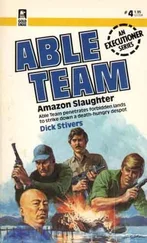"L.A.'s got one army of crazies out there already. An army of doper zombies."
They continued to the crowded baggage pickup area. Knowing the traps and frustrations of international airports, Lyons waited until Gadgets and Blancanales took their bags from the oval conveyor belt before he and Flor went for their parked rental car.
Minutes later they sped from the international airport. Lyons navigated the car through the stream of traffic on Century Boulevard. They passed high-rise hotels and rows of pornographic bookstores and "adult cinemas." Gadgets peered out at the neon and lurid billboards.
"This specialist work we do is so amazing," he said. "One day in Bolivia, the next in California. I never get tired of this — the places we go, the things we do."
Flor turned to the men in the back seat and said, "Do you think we can make any difference? Only the four of us?"
Blancanales laughed. "Miss Trujillo, if you only knew…"
"We make things different," Gadgets nodded. "Wherever we go. Good or bad, things get changed. In fact, dig it, Ironman — Konzaki's taking a seminar in robotics. Says he's going to replace us. With titanium Godzillas."
Flor waited for the laughter to stop, then pressed her question. "But there are many police — thousands — already working. How can only four more make any difference?"
"We'll see what we can do and do it," Gadgets responded.
"That's it," Lyons agreed. "That is it."
On the freeway, Blancanales and Gadgets noticed the empty lanes. On most weekday evenings, drivers commuting home late from work or early for the theaters and nightspots of the metropolis would crowd the freeways. Not tonight.
"Where is everybody?" Gadgets asked. "Usually, there's more traffic than this after one in the morning."
"The murders?" Blancanales asked.
"What do you think?" Lyons asked him. "After a day and night of continuous media hype and on-the-spot video gore…"
"Fear City," Gadgets commented.
Half an hour of driving took them to the Civic Center. Lyons drove down into the guarded and patrolled underground garage for city employees. Their "federal" identification persuaded a uniformed officer to issue a guest sticker.
At the reception desk of Parker Center, Lyons again flashed his federal identification. "We're here to talk to Detective Towers."
"Took you long enough to get here," the desk cop answered. "Detective Towers told me to expect you. Interrogation's been going on for two hours."
" Interrogation of who?"
"Not anything I know about. But they got him the room with the mirrors."
As soon as the desk officer issued four identification badges, the group rushed for the third floor. Uniformed and plainclothes officers crowding the corridor glared at the strangers.
"Who are you?" a sergeant demanded.
"Towers invited us to listen in," Lyons told him.
"Oh, yeah?" The sergeant turned to another officer, "Check with Bill."
"Who have they got in there?"
"That's for Detective Towers to say."
"Hey, Sergeant," Lyons protested, offended by the interdepartmental hostility. "We're on your side."
"Yeah, they all say that."
Bill Towers rushed from the interrogation room. He opened another door and motioned the four Federals inside. He waited until the door closed to tell them, "We got our break."
"One of the punks?" Lyons asked.
Grinning, Towers shook his head. "Not a punk. A superpunk. We got the one who gave them the rifle. He recruited the punks, his organization trained them, and he gave them the rifle."
The four Federal specialists glanced to one another.
Bill Towers continued, his voice rising with enthusiasm. "We got a chance. We got a chance to break them. Tonight!"
Shabaka, a mullah of Allah and a warrior in the Holy War against the white devils of Satan, received the command to disperse his soldiers and dismantle or destroy his indoctrination center.
At seven o'clock, Mario Silva, the chairman of LAYAC, telephoned Shabaka with the information of the capture of Ruiz. Silva told him that Ruiz would undoubtedly betray the organization to the police to save himself from prison. Shabaka had answered in monosyllables, then hung up the telephone.
Abdul Shabaka, born with the devil name of Leroi Jackson, had known from the first day that the betrayal of the bourgeois front organization would be only a matter of time.
As a veteran of the Black Panthers, the Death's Angels and the Black Liberation Army, he knew any organization risked infiltration and betrayal. The FBI had infiltrated and neutralized the Panthers. Informers had betrayed the holy Muslim warriors of the Death's Angels to the San Francisco police. Informers had broken the Black Liberation Army.
Even as a teenage recruit in the Black Panthers, Shabaka recognized the inevitable defeat of any open organization. The Panther leadership had welcomed him, a rapist and petty thief, because of his juvenile record of crimes against whites. They knew little else of his life. He had expected a careful check into his past and a long interrogation. But the Panthers had accepted him after listening to his stories of "revolutionary acts against the slavemakers." This easy entry to the revolutionary organization surprised him. As the numbers of Panthers grew, each new recruit joining with the same ease, he knew the organization had swallowed the seeds of its own destruction.
The Panthers made no secret of their goals. The leaders published manifestos of racial hatred. At rallies, they pranced and posed in their leather jackets and preached social justice through the murder of police officers. They spat out their black racist diatribes from stages or in front of the microphones of radical radio stations.
The Panthers knew all about the police surveillance. Police followed the Panthers everywhere, recording their words, photographing each leader and his aides and their friends. The ex-con leaders of the Panthers gloried in the surveillance. They accepted surveillance as an affirmation of the Black Panther Party as a threat to white racist society and the fascist corporate power structure.
At meetings and rallies, the teenage Leroi Jackson looked at the young militants around him and wondered who worked for the police and who worked for the FBI. Other Panthers — the hardcore felons who'd had experience with prison informers — also believed the police slipped agents into the organization. The hard-core Panthers developed techniques to discover the agents; they initiated surveillance of one another, they investigated backgrounds, and they launched "actions."
The Panther leadership had often talked of "strikes against the fascist monster." The hardcore Panthers screened the membership and identified the recruits they doubted. Then they invited these recruits on actions: the assassination of a detective, the driveby strafing of a police station, the bombing of a city councilman's office.
At first, the police acted immediately on their agents' information and struck the Panthers. But they found the hardcore killers waiting quietly in their apartments, without explosives, without illegal weapons, without any weapons whatsoever.
Antiterrorist detectives cautioned their remaining agents and informers to wait until the Panthers actually put a conspiracy in motion. But the Panthers varied their techniques; sometimes they organized an attack, then as the "front line brothers" approached the target, they canceled the hit, replanned and announced another time. This forced the agents to contact their officers again and again. That was how the Panthers caught them. Some agents died. Others fled.
Leroi Jackson fled the Panthers for the closed society of the Nation of Islam. He joined a radical sect obsessed with hatred and racism, where he found many other young blacks who shared his lust for violence against whites. In obedience to the leaders who preached myths of pale, blue-eyed creatures bred by the Devil to plague the world, a group of felons and psychopaths created a secret cult of random racial murder.
Читать дальше
